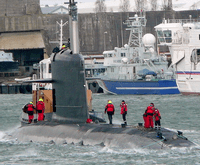As if to illustrate the challenges facing an integrated European defense market, the French naval shipyard DCNS is suing Spain's leading state-owned shipbuilding firm, Navantia, for allegedly stealing trade secrets relating to the Scorpène submarine project. The two companies originally developed the Scorpène as part of a joint venture. But DCNS now accuses its Spanish partner of copying Scorpène technology and using it for the new S-80 submarine that Navantia is building both for the Spanish Navy as well as for export markets, where it will compete with the Scorpène.
Navantia says the dispute originated in July 2005, when the Spanish government selected Lockheed Martin, the U.S. defense conglomerate, to supply the S-80's next-generation combat management system. Spain had been under intense pressure to choose a European (read: French DCNS) system. The tensions escalated when Navantia fielded the S-80 in several submarine tenders, particularly one recently floated by Turkey, in which DCNS was hoping to sell its Marlin class vessels. (Turkey ultimately awarded the $4 billion contract to the German shipyard HDW-MFI.) Then, in 2008, France sold Brazil four Scorpène submarines as part of a "strategic defense alliance" that excluded Navantia.
Despite the dispute, which could have far-reaching consequences for France and Spain in the international market for submarines, the Scorpène remains the largest and most important defense-industrial product jointly produced by the two countries. It has also been extremely profitable for both sides. Navantia and DCNS have sold a total of 14 Scorpène submarines worth billions of dollars to four countries: Brazil (4), Chile (2), India (6) and Malaysia (2).

